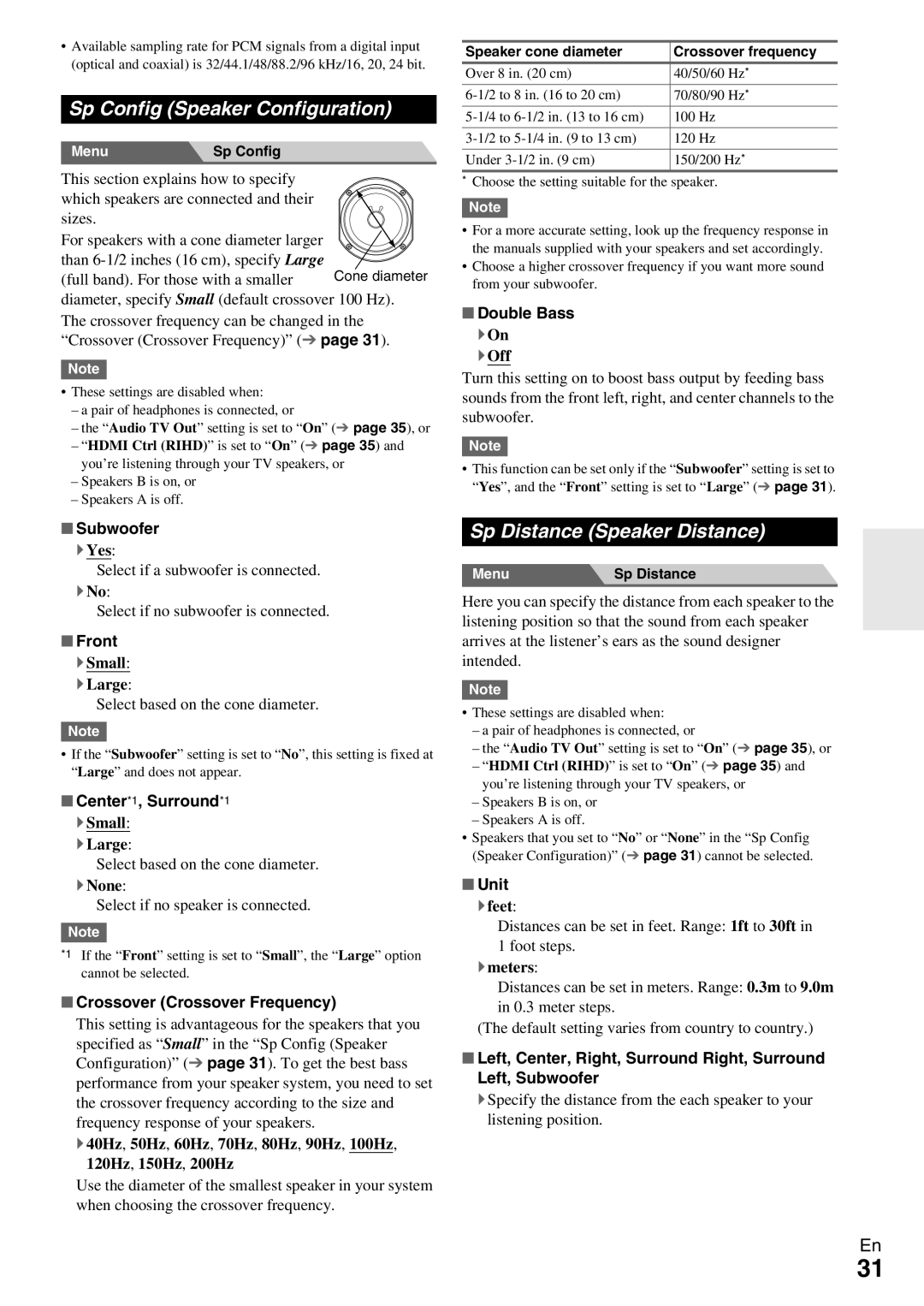
•Available sampling rate for PCM signals from a digital input (optical and coaxial) is 32/44.1/48/88.2/96 kHz/16, 20, 24 bit.
Sp Config (Speaker Configuration)
Menu | Sp Config |
This section explains how to specify
which speakers are connected and their sizes. For speakers with a cone diameter larger than
(full band). For those with a smaller
diameter, specify Small (default crossover 100 Hz). The crossover frequency can be changed in the “Crossover (Crossover Frequency)” (➔ page 31).
Note
•These settings are disabled when:
–a pair of headphones is connected, or
–the “Audio TV Out” setting is set to “On” (➔ page 35), or
–“HDMI Ctrl (RIHD)” is set to “On” (➔ page 35) and you’re listening through your TV speakers, or
–Speakers B is on, or
–Speakers A is off.
■Subwoofer
`Yes:
Select if a subwoofer is connected.
`No:
Select if no subwoofer is connected.
■Front
`Small:
`Large:
Select based on the cone diameter.
Note
•If the “Subwoofer” setting is set to “No”, this setting is fixed at “Large” and does not appear.
■Center*1, Surround*1
`Small:
`Large:
Select based on the cone diameter.
`None:
Select if no speaker is connected.
Note
*1 If the “Front” setting is set to “Small”, the “Large” option cannot be selected.
■Crossover (Crossover Frequency)
This setting is advantageous for the speakers that you specified as “Small” in the “Sp Config (Speaker Configuration)” (➔ page 31). To get the best bass performance from your speaker system, you need to set the crossover frequency according to the size and frequency response of your speakers.
`40Hz, 50Hz, 60Hz, 70Hz, 80Hz, 90Hz, 100Hz, 120Hz, 150Hz, 200Hz
Use the diameter of the smallest speaker in your system when choosing the crossover frequency.
Speaker cone diameter | Crossover frequency |
|
|
Over 8 in. (20 cm) | 40/50/60 Hz* |
70/80/90 Hz* | |
100 Hz | |
|
|
120 Hz | |
|
|
Under | 150/200 Hz* |
*Choose the setting suitable for the speaker.
Note
•For a more accurate setting, look up the frequency response in the manuals supplied with your speakers and set accordingly.
•Choose a higher crossover frequency if you want more sound from your subwoofer.
■Double Bass
`On
`Off
Turn this setting on to boost bass output by feeding bass sounds from the front left, right, and center channels to the subwoofer.
Note
•This function can be set only if the “Subwoofer” setting is set to “Yes”, and the “Front” setting is set to “Large” (➔ page 31).
Sp Distance (Speaker Distance)
Menu | Sp Distance |
Here you can specify the distance from each speaker to the listening position so that the sound from each speaker arrives at the listener’s ears as the sound designer intended.
Note
•These settings are disabled when:
–a pair of headphones is connected, or
–the “Audio TV Out” setting is set to “On” (➔ page 35), or
–“HDMI Ctrl (RIHD)” is set to “On” (➔ page 35) and you’re listening through your TV speakers, or
–Speakers B is on, or
–Speakers A is off.
•Speakers that you set to “No” or “None” in the “Sp Config (Speaker Configuration)” (➔ page 31) cannot be selected.
■Unit
`feet:
Distances can be set in feet. Range: 1ft to 30ft in 1 foot steps.
`meters:
Distances can be set in meters. Range: 0.3m to 9.0m in 0.3 meter steps.
(The default setting varies from country to country.)
■Left, Center, Right, Surround Right, Surround Left, Subwoofer
`Specify the distance from the each speaker to your listening position.
En
31
